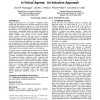15 search results - page 3 / 3 » A Unified Cognitive Architecture for Physical Agents |
ISVC
2007
Springer
13 years 11 months ago
2007
Springer
Abstract. Understanding intent is an important aspect of communication among people and is an essential component of the human cognitive system. This capability is particularly rel...
AGENTS
2001
Springer
13 years 9 months ago
2001
Springer
Emotions play a critical role in creating engaging and believable characters to populate virtual worlds. Our goal is to create general computational models to support characters t...
FLAIRS
2007
13 years 7 months ago
2007
As personal assistant software matures and assumes more autonomous control of its users’ activities, it becomes more critical that this software can explain its task processing....
ATC
2010
Springer
13 years 4 months ago
2010
Springer
Co-Space refers to interactive virtual environment modelled after the real world we are situated in. Through realistic 3D modelling and animation technologies, Co-Space simulates t...
ATAL
2008
Springer
13 years 7 months ago
2008
Springer
Humans continuously assess one another's situational context, modify their own affective state, and then respond based on these outcomes through empathetic expression. Virtua...

